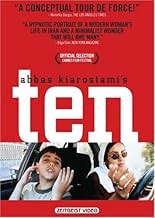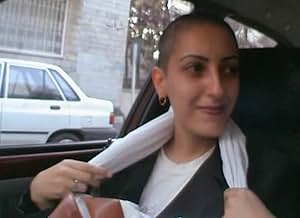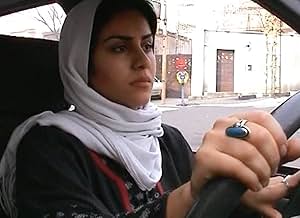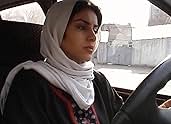VALUTAZIONE IMDb
7,4/10
8900
LA TUA VALUTAZIONE
Un'indagine sociale nella forma di dieci conversazioni tra una donna che guida e i vari ospiti e passeggeri di lei.Un'indagine sociale nella forma di dieci conversazioni tra una donna che guida e i vari ospiti e passeggeri di lei.Un'indagine sociale nella forma di dieci conversazioni tra una donna che guida e i vari ospiti e passeggeri di lei.
- Regia
- Sceneggiatura
- Star
- Premi
- 1 vittoria e 4 candidature totali
Amina Maher
- Amin
- (as Amin Maher)
Roya Akbari
- Prostitute + Lover
- (as Roya Arabshahi)
Recensioni in evidenza
"Ten" makes the third Iranian film I have seen. I was very impressed with the last two I saw and so I decided to see this one and I was not disappointed.
Abbas Kiarostami gives "reality tv" (movie ?) a whole new meaning by having a mini camera installed on the dashboard of a car to video tape what appears to be a woman's daily driving routine.
There are ten segments that are video taped (hence the title of the movie) as she drives to and from her daily activities.
First off, we get to see her and her son, Amin, discussing her divorce from Amin's father and how displeased Amin is with the fact that they divorced. Amin, of course, is bitter, as most children are who have had to live thru a divorce. He desperately wants to go live with his father.
Two more times throughout the movie we see Amin and his mother furthering their discussion and we get to see how their relationship continues to deteriorate.
Amin's mother and her sister are seen in one segment discussing Amin and his behavior and the aunt even gives her opinion that it might be better for the boy to go live with the father on a full time basis for a while.
We also see Amin's mother give an old lady a lift to a mauseliam so the old lady can go do her religious rituals.
Amin's mother also gives a lift to a hooker and talks with her for a while in hopes to get her to chose a different life.
All in all, the movie shows a deeply sensitive woman who wants to help others and be there for her son while being her own person.
It's truly a heart felt movie to see how caring she is even though her relationship with her son appears doomed.
Abbas Kiarostami gives "reality tv" (movie ?) a whole new meaning by having a mini camera installed on the dashboard of a car to video tape what appears to be a woman's daily driving routine.
There are ten segments that are video taped (hence the title of the movie) as she drives to and from her daily activities.
First off, we get to see her and her son, Amin, discussing her divorce from Amin's father and how displeased Amin is with the fact that they divorced. Amin, of course, is bitter, as most children are who have had to live thru a divorce. He desperately wants to go live with his father.
Two more times throughout the movie we see Amin and his mother furthering their discussion and we get to see how their relationship continues to deteriorate.
Amin's mother and her sister are seen in one segment discussing Amin and his behavior and the aunt even gives her opinion that it might be better for the boy to go live with the father on a full time basis for a while.
We also see Amin's mother give an old lady a lift to a mauseliam so the old lady can go do her religious rituals.
Amin's mother also gives a lift to a hooker and talks with her for a while in hopes to get her to chose a different life.
All in all, the movie shows a deeply sensitive woman who wants to help others and be there for her son while being her own person.
It's truly a heart felt movie to see how caring she is even though her relationship with her son appears doomed.
The front-page review of this film simply doesn't do this marvelous film justice. Renowned Iranian film-maker Abbas Kiarostami takes an innovative approach at giving us a very deep glimpse not only into the life of mother and child, but also into Iran, its society and the situation of women transitioning to a more assertive role in society (however, I don't think one should be confused that the issues women face in Iran are not relevant to women elsewhere in the world, including the West).
The film has two fixed camera angles, one giving us a view of the driver-side and the other a view of the passenger side of an automobile. The driver is a mother who has left her husband and now resides with her new lover (she is the common thread in all ten "episodes"). Each sequence places a different person in the passenger seat, with particular emphasis on her son (who rides in four of the 10 scenes, if I'm not mistaken).
It is this mother-son relationship that is at the crux of the film, and for good reason. The performances of these two characters was nothing short of amazing. The boy in particular, with every eye-twitch, frown, smile, and outburst was able to convey a frighteningly realistic portrayal of a boy who is all at once obstinate, angry, disrespectful, and immature, yet still sweet and somewhat an innocent victim of the situation. He is unforgiving to his mother for walking out on him and "breaking up the family" and is reluctant to accept any explanation his mother offers. They trade barbs and though the love is there, you can see the seeds already planted in the young adolescent of a society that subordinates women to their male partners. Here, it is so profound that even a pre-teen lectures his mother on right and wrong.
The mother bounces back and forth between defending herself to accepting blame, showing the cracks of guilt that clearly lie beneath her composed and beautiful surface. And it's a beauty that her son can't recognize: she's a sexy passionate woman with needs of not just a mother but also as a lover and a liver; but like all children he can only see her as an adult and a mother.
The other key character involves a friend who desperately seeks a life partner, but finds herself unsuccessful at every turn. Most recently, a man she has been seeing tells her that he cannot marry her because he does not love her. She coyly reveals from under her veil that in her grief she has shaved her head completely. This act is astonishing not because it is defiant but because it is terribly charming. She can't offer an explanation as to why she has done it, but no explanation is necessary. Who hasn't at some time when an ego has been made fragile by rejection, sought to change hair, clothing, face, self? And it is with this scene, with veil pulled back, that the woman's beauty is uncovered, not because we see her hair or her bald head, but because of the insight the shaving act gives to her character, and her innocent embarrassment brings a smile to her tear-stained face that lights up the screen.
I give the film a 9 and not a 10 because of one sequence involving a conversation with a prostitute in the passenger seat. Presumably the driver has given a ride to hitch-hiker, leading to an intelligent conversation/debate about the world's oldest profession. But this scene seemed a little out-of-place, contrived, and added little to the more general theme of the rest of the film. This one slip-up notwithstanding, "Ten" is a creative and wonderful experience for film lovers who seek something out of the ordinary. And it has a final scene which punctuates the film perfectly.
The film has two fixed camera angles, one giving us a view of the driver-side and the other a view of the passenger side of an automobile. The driver is a mother who has left her husband and now resides with her new lover (she is the common thread in all ten "episodes"). Each sequence places a different person in the passenger seat, with particular emphasis on her son (who rides in four of the 10 scenes, if I'm not mistaken).
It is this mother-son relationship that is at the crux of the film, and for good reason. The performances of these two characters was nothing short of amazing. The boy in particular, with every eye-twitch, frown, smile, and outburst was able to convey a frighteningly realistic portrayal of a boy who is all at once obstinate, angry, disrespectful, and immature, yet still sweet and somewhat an innocent victim of the situation. He is unforgiving to his mother for walking out on him and "breaking up the family" and is reluctant to accept any explanation his mother offers. They trade barbs and though the love is there, you can see the seeds already planted in the young adolescent of a society that subordinates women to their male partners. Here, it is so profound that even a pre-teen lectures his mother on right and wrong.
The mother bounces back and forth between defending herself to accepting blame, showing the cracks of guilt that clearly lie beneath her composed and beautiful surface. And it's a beauty that her son can't recognize: she's a sexy passionate woman with needs of not just a mother but also as a lover and a liver; but like all children he can only see her as an adult and a mother.
The other key character involves a friend who desperately seeks a life partner, but finds herself unsuccessful at every turn. Most recently, a man she has been seeing tells her that he cannot marry her because he does not love her. She coyly reveals from under her veil that in her grief she has shaved her head completely. This act is astonishing not because it is defiant but because it is terribly charming. She can't offer an explanation as to why she has done it, but no explanation is necessary. Who hasn't at some time when an ego has been made fragile by rejection, sought to change hair, clothing, face, self? And it is with this scene, with veil pulled back, that the woman's beauty is uncovered, not because we see her hair or her bald head, but because of the insight the shaving act gives to her character, and her innocent embarrassment brings a smile to her tear-stained face that lights up the screen.
I give the film a 9 and not a 10 because of one sequence involving a conversation with a prostitute in the passenger seat. Presumably the driver has given a ride to hitch-hiker, leading to an intelligent conversation/debate about the world's oldest profession. But this scene seemed a little out-of-place, contrived, and added little to the more general theme of the rest of the film. This one slip-up notwithstanding, "Ten" is a creative and wonderful experience for film lovers who seek something out of the ordinary. And it has a final scene which punctuates the film perfectly.
I have seen many impressive Iranian films over the years. "Ten" may be the very best of them for a variety of reasons. I think the film is remarkable because it looks so simple, but I imagine setting up the camera and capturing the realistic dialogue and plot-line we see in the film had to have taken a lot of preparation. I also think the director deliberately chose scenery to accommodate the backdrop of the film, and he must have driven around Teheran constantly to figure out which images to put in the background. I think the scenes with the murals of new arch-conservative president are very telling. "Ten" seems to have a lot of messages under the radar, including the subversive powers of all governments (certainly including our own in America) to censor art. I think the relationship between the mother and her son is a very poignant one, and it shows how children and adults simply live in different spheres of the universe. Film is strikingly similar in some aspects to American independent filmmaker Rob Nilsson's film "Signal 7" which came out over 20 years ago.
Ten is an intriguing movie. Kiarostami explores the abilities of digital camera by mounting it at just two fixed angles on the dashboard of a car, showing us almost only the driver's and the passenger's faces. Such a stationary structure surprises by its moving content, which takes shape as the movie unfolds.
The driver is a young Iranian divorcée, recently remarried, whose conversations with a son, sisters, a young and an old woman makes up the ten episodes of the movie.
The performance taken from the kid is astonishingly natural, and other characters also appear to be just playing their everyday lives. Kiarostami opens an eye through the little gap of its two fixed digital cameras on the mundane facts of the Iran's capital life as experienced by a typical middle-class woman. The plots are so natural no one can find a better way of experiencing the knotted, contradictory complexity of such a woman's life in Iran from outside. The flow is of the scenes is smooth and the dialogues are, at least to the Iranian audience, courageous and funny, though familiar at the same time. It's a movie worth watching more than once.
The driver is a young Iranian divorcée, recently remarried, whose conversations with a son, sisters, a young and an old woman makes up the ten episodes of the movie.
The performance taken from the kid is astonishingly natural, and other characters also appear to be just playing their everyday lives. Kiarostami opens an eye through the little gap of its two fixed digital cameras on the mundane facts of the Iran's capital life as experienced by a typical middle-class woman. The plots are so natural no one can find a better way of experiencing the knotted, contradictory complexity of such a woman's life in Iran from outside. The flow is of the scenes is smooth and the dialogues are, at least to the Iranian audience, courageous and funny, though familiar at the same time. It's a movie worth watching more than once.
My experience with Iranian film is pretty superficial having only seen a handful, but none have disappointed me. I saw Kiarostami's early film Where Does The Friend Live? and was completely blown away. I then saw Saalam Cinema by Iran's other giant Mohsen Makhmalbaf - and then I realised just how important this country's output has been.
Ten did nothing to diminish this view, and I'll try not to repeat much of what's already been said here. I saw an Iranian person on this site claim that there was too much lost in the translation from Farsi to English. This is always the case with translation, but I am quite sure Ten gets away with it. I recently saw Ingmar Bergman's Saraband and if you think language being stilted ruins a movie then I am sure seeing that film will shatter the view. The single thing that destroys it in both cases is the incredible power of the acting - the truth lies in their facial expression. I am quite sure 9 out of 10 people asked without context would swear blind Ten was a documentary.
In the western world overrun by "reality" TV, its significance is lost on some, but if you take the time to realise that these people are actually acting - and more than likely doing it for the first time - thats where the power lies. Try taking this film, put it in America and put Hollywood A-Listers in the car and see where it goes. Basically, how you could call both what they do and what happens in this film acting is opened to debate. This is true of the majority of Iranian output.
Ten would be significant for these reasons alone, but when you take into account how much insight you gain into the life of a woman in there who tries to say no to male domination and to "love herself" it really comes into its own. This is the case of much of this countries output - and what sets is far apart from other countries. What we learn ultimately is this struggle, though perhaps more explicit in Iran, is a struggle felt by all women in the world. It's a film which in that way unites rather than divides which in light of Iran's current status in global affairs is what probably what makes it one of the more important Cinema's in the world.
Ten did nothing to diminish this view, and I'll try not to repeat much of what's already been said here. I saw an Iranian person on this site claim that there was too much lost in the translation from Farsi to English. This is always the case with translation, but I am quite sure Ten gets away with it. I recently saw Ingmar Bergman's Saraband and if you think language being stilted ruins a movie then I am sure seeing that film will shatter the view. The single thing that destroys it in both cases is the incredible power of the acting - the truth lies in their facial expression. I am quite sure 9 out of 10 people asked without context would swear blind Ten was a documentary.
In the western world overrun by "reality" TV, its significance is lost on some, but if you take the time to realise that these people are actually acting - and more than likely doing it for the first time - thats where the power lies. Try taking this film, put it in America and put Hollywood A-Listers in the car and see where it goes. Basically, how you could call both what they do and what happens in this film acting is opened to debate. This is true of the majority of Iranian output.
Ten would be significant for these reasons alone, but when you take into account how much insight you gain into the life of a woman in there who tries to say no to male domination and to "love herself" it really comes into its own. This is the case of much of this countries output - and what sets is far apart from other countries. What we learn ultimately is this struggle, though perhaps more explicit in Iran, is a struggle felt by all women in the world. It's a film which in that way unites rather than divides which in light of Iran's current status in global affairs is what probably what makes it one of the more important Cinema's in the world.
Lo sapevi?
- QuizApart from Mania Akbari, actors are non-professional. The young boy is played by her own son and their relationship is partly based on real-life elements.
- BlooperCar windows, both driver's and passenger's, vary between being closed, part-open or open between shots.
- Citazioni
Prostitute: [to a Married woman] You are wholesailers. We are retailers.
- ConnessioniFeatured in 10 on Ten (2004)
- Colonne sonoreWalking In The Air
Written and Performed by Howard Blake
© Chester Music Limited represented by Première Music Group
I più visti
Accedi per valutare e creare un elenco di titoli salvati per ottenere consigli personalizzati
- How long is Ten?Powered by Alexa
Dettagli
- Data di uscita
- Paesi di origine
- Sito ufficiale
- Lingua
- Celebre anche come
- Ten
- Luoghi delle riprese
- Aziende produttrici
- Vedi altri crediti dell’azienda su IMDbPro
Botteghino
- Lordo Stati Uniti e Canada
- 105.990 USD
- Fine settimana di apertura Stati Uniti e Canada
- 10.559 USD
- 9 mar 2003
- Lordo in tutto il mondo
- 452.895 USD
Contribuisci a questa pagina
Suggerisci una modifica o aggiungi i contenuti mancanti






















